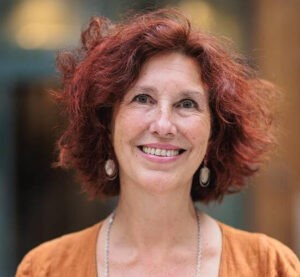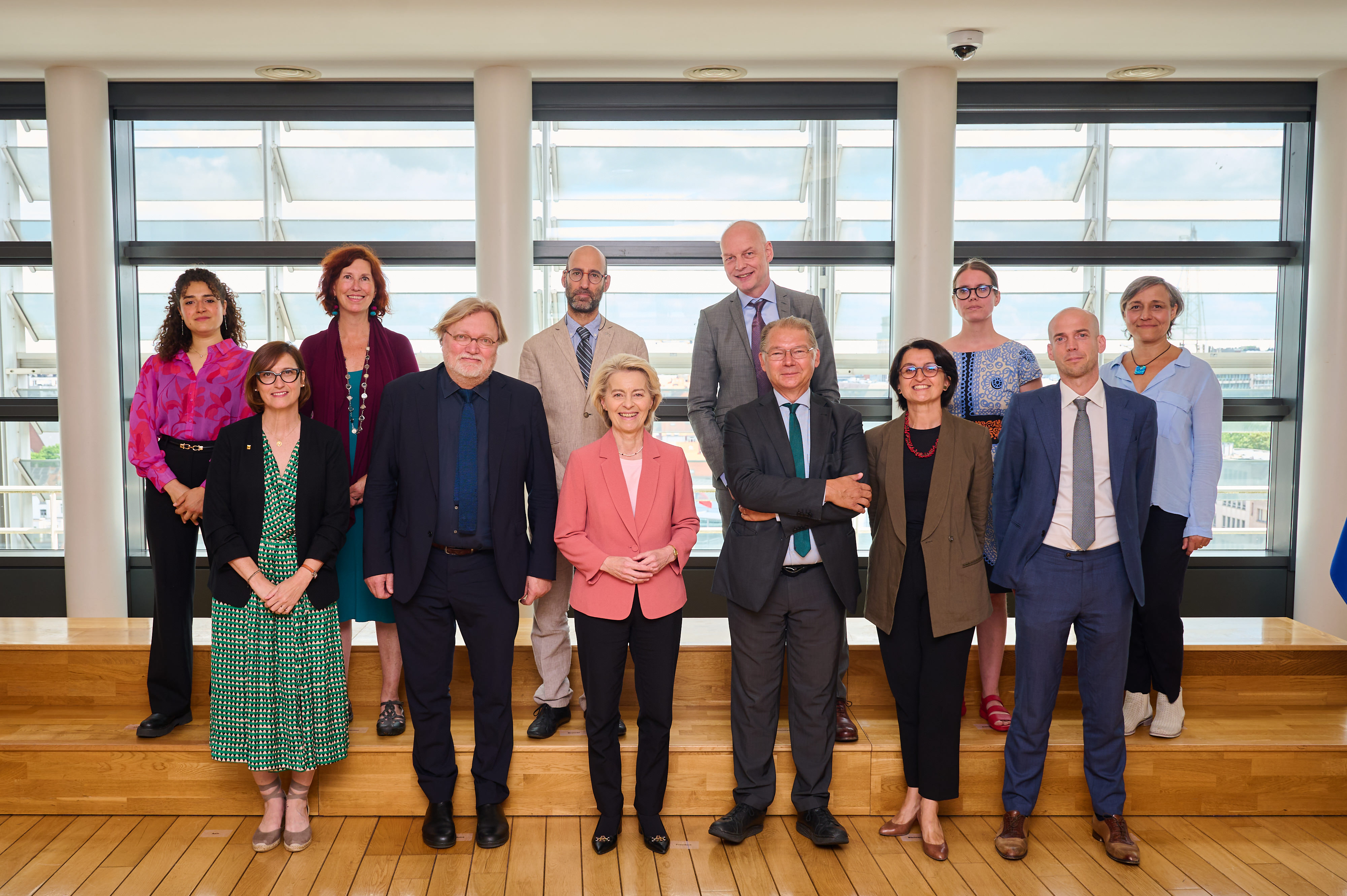Today, directors of the Green 10, of which HEAL is a member, met with European Commission President von der Leyen and shared civil society’s recommendations for policy action.
by Genon K. Jensen, founder and Executive Director
 Twenty years ago, I realised that environmental pollution is linked to ill health and serious acute and chronic diseases, like cancer, asthma and respiratory diseases. This is when I launched into my environmental health journey and founded HEAL. It became clear to me that our ways of living and the environmental pollution resulting from that impacted our health. I wanted to know more about the impacts and the extent, how much of it was preventable, and what role and power policy-making could have in it. Having just had a baby, I was shocked to discover that they were (and still are) exposed to pollution, even before they are born, with a myriad of risks and consequences for their health and healthy development. Newborns are subject to irreversible IQ loss due to mercury contamination, children are at a higher-risk of cancer because of exposure to some pesticides, and particulate matter pollution in the air can, through the mother’s bloodstream, bypass the placenta and affect the baby’s organs as they develop.
Twenty years ago, I realised that environmental pollution is linked to ill health and serious acute and chronic diseases, like cancer, asthma and respiratory diseases. This is when I launched into my environmental health journey and founded HEAL. It became clear to me that our ways of living and the environmental pollution resulting from that impacted our health. I wanted to know more about the impacts and the extent, how much of it was preventable, and what role and power policy-making could have in it. Having just had a baby, I was shocked to discover that they were (and still are) exposed to pollution, even before they are born, with a myriad of risks and consequences for their health and healthy development. Newborns are subject to irreversible IQ loss due to mercury contamination, children are at a higher-risk of cancer because of exposure to some pesticides, and particulate matter pollution in the air can, through the mother’s bloodstream, bypass the placenta and affect the baby’s organs as they develop.
But it doesn’t stop there: we are all exposed to pollution, a cocktail of pollutants, throughout our lifetime, and no lifestyle change or individual choice can protect us adequately. Knowing this, my determination grew to set up an NGO to make a difference through stronger policies for greater health protection. EU environmental policy offered a rich landscape to address this pollution, prevent disease for people living on the continent and beyond, and serve as good practice for policies and regulations much further beyond.
It was my strong belief then, and it is still today, that pointing out the connection between the environment and people’s health is a powerful way to move the debate to a more holistic and sustainable approach, instead of continuing to think about the economy, the environment, and society in silos. Talking about how our health is affected by pollution can contribute immensely to the environmental and public health movements, create more support for EU environmental policies, and even explain why it makes economic science for societies to protect the environment we live in.
As HEAL set up shop in Brussels, we spent our first years tending the HEAL environmental health garden: we prepared the soil and planted the seeds of health engagement, science to policy communication, and advocacy for EU policy change. Our alliance brought together passionate people working in the secretariat, within our membership and our partners, and grew – from six founding members and a secretariat with only a few team members in 2003 to over 80 member organisations in 2023 and over 20 staff, in Brussels and other European locations. There is a vibrant and dedicated health sector from North to South, East to West – in Europe and globally – active on environment and climate policies.
Health engagement has been at the core of our mission since the start: we have focused our efforts on informing health actors, building capacity, working together and bringing the health voice and expertise to environmental and climate policy making. In just over a decade, health engagement on climate grew from a handful of individuals to hundreds of organisations; over 70 health and public interest organisations are active for an EDC-Free Europe, and more than 100 organisations from all over Europe are calling for health protective clean air standards.
Bringing forward independent and emerging science on health, environment and climate has been HEAL’s daily business since day one. Our overarching mission is to articulate how our health is affected by pollution, backed up with evidence on how environmental contaminants in our air, food, water, products are linked to serious health conditions and diseases. Twenty years ago, we started our advocacy around the monogram on tackling environmental threats like chemicals, air pollution or pesticides to protect children’s health published by WHO and the European Environment Agency (EEA). This was really a new frame at the time – especially how children are most at risk from developmental disorders and cancer to name a few. Today, the body of evidence is robust – overwhelming really. It highlights how pollution is responsible for dozens and dozens of health conditions and the latest research on impacts from pollutants’ mixtures and combinations, as well as from low level pollution, is a wakeup call.
HEAL was also one of the first organisations to make the economic case for the co-benefits to people’s health living in Europe by adopting more ambitious air, climate and chemicals policies, which in turn reduce healthcare costs. With a series of reports over the years, we calculated the health benefits of stronger EU action on climate change in 2010, the unpaid health bill from the burning of coal in 2013, as well as health costs from our exposure to endocrine disrupting chemicals (EDCs) in 2014. In 2017 we shone the spotlight on the hidden price tag of subsidising fossil fuels, and in 2022 we presented the first ever figures on the health cost of fossil gas power generation. These assessments sparked public and policy debates at the EU, national and local level, and led to tangible health improvements, e.g. with the shelving of new coal projects, commitments to coal phase out dates, or the adoption of criteria to identify EDCs, as the first step to phase them out.
Our science to policy communication, health engagement and advocacy work not only showcases the real health impacts, but also puts forward the good news on how protective EU environmental, climate policies can significantly reduce this health harm and prevent disease, and HEAL has certainly made an impact in putting health consideration more firmly in some major environmental and climate policies over the past two decades. Some of the first advocacy seeds that we planted and nurtured were in the major EU environment and climate laws like the REACH regulation on chemicals in 2006, the ambient air quality directive in 2008 or the pesticide authorisation and reduction laws in 2009. Today they are now key pieces of legislation and policies being revised as part of the EU Green Deal with an overarching objective of zero pollution, something that our community has pushed for and contributed to making a political possibility – we have come so far.
Everyone’s health is affected by pollution. Some are more vulnerable than others, including children, older people, those already sick and those facing health inequalities. While we have made progress in getting the voices of those affected heard and succeeded in changing policies and politics, our work is far from done. A robust and growing body of evidence exists on how far-reaching the harm to health is from exposure to chemicals, pesticides, air pollution, and the accelerating triple crisis of climate change, pollution and biodiversity loss underscores why the continued engagement of the HEAL family and our network is essential.
We certainly know enough to act, and we need to act urgently, in order to achieve the much needed transformation in this decade. Health professionals are among the most trusted voices in society, and this health voice is needed more than ever in times of a growing backlash against the EU Green Deal, delays in regulatory action, eco-anxiety, economic hardship, and the war in Ukraine.
Our mission is still as relevant as ever. We strive to ensure that health evidence and voices are heard and acted on by politicians in Europe and beyond so that those most at risk by pollution can be protected. I am confident our alliance will continue to sow seeds of policy change and increase engagement to help shape laws on chemicals, pesticides, air quality, climate change and energy over the next years.
We invite you to join us in our journey to work towards a healthy planet for healthy people, one that promotes health and delivers a just transition for all.


